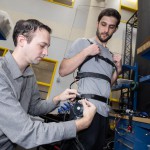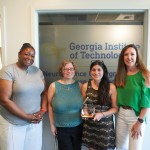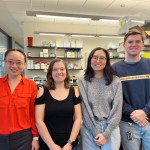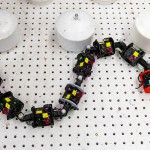In the Press
Pagination
News Listings
Georgia Tech engineers are refining AI tools and deploying them to help individuals, cities, and…
Engineers working in machine learning and AI offer a crash course in the basic concepts and…
College of Sciences Academic Professional Christina Ragan is among the recipients of the 2024…
College of Sciences graduate Anisha Kanukolanu is among the Georgia Tech students and alumni who…
Georgia Tech and KSU faculty are putting a collaborative AI system they’ve developed to the…
Margaret E. Kosal will help a Georgia Tech Research Institute team examining what models will work…
Han will investigate whether blocking specific neurons can help inhibit asthma — which may provide…
Worms and snakes seem to wiggle their way across varying environments without needing to learn the…
Gregory Sawicki and Aaron Young will use artificial intelligence to personalize exoskeleton…
Biomedical engineer Annabelle Singer has spent the past decade developing a noninvasive therapy for…










